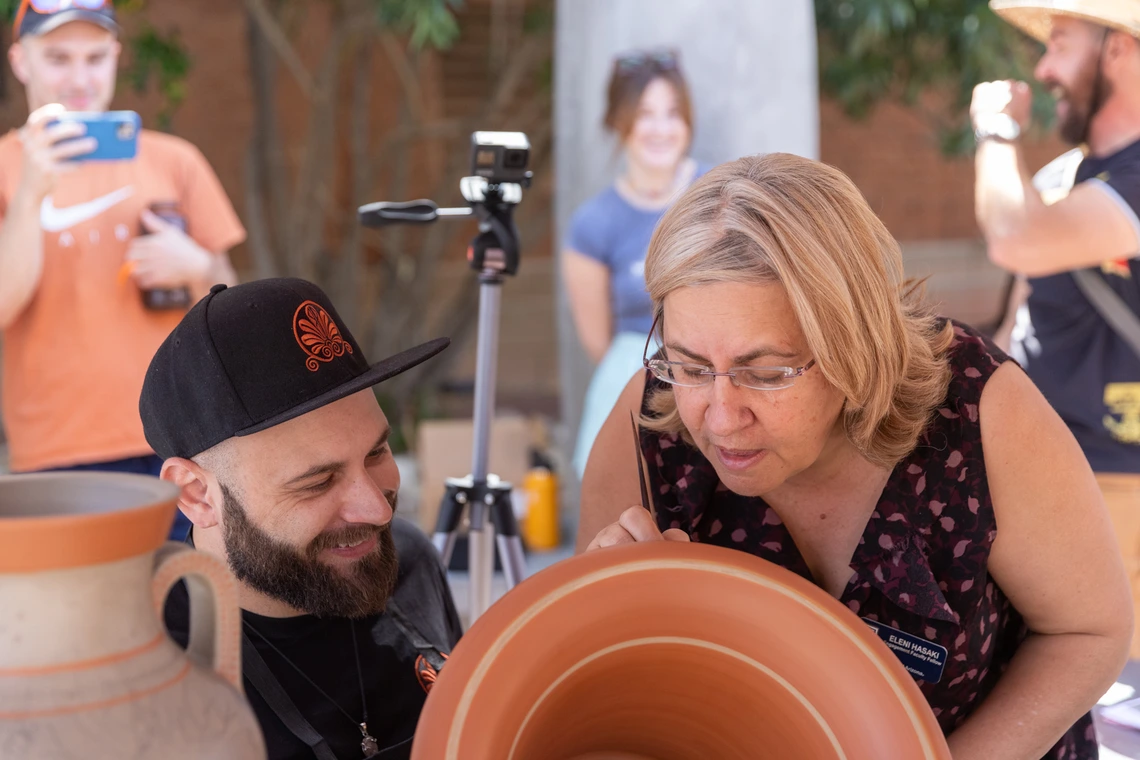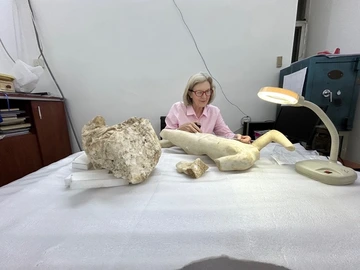Two U of A antiquities experts named members of the Institute for Advanced Study

Eleni Hasaki (right), professor of anthropology and classics and an expert on ancient Greek ceramics, discusses the work of Roberto Paolini, an artist from Cerveteri, Italy, who visited campus in 2023 to demonstrate an ancient technique called red-figure vase painting for Hasaki's students. Hasaki and Irene Bald Romano, a professor of art history and anthropology and curator of Mediterranean archaeology at the Arizona State Museum, were named members of the prestigious Institute for Advanced Study.
Kyle Mittan/University Communications
A prestigious, century-old institute has named two University of Arizona faculty to its membership ranks thanks to their scholarship on ancient Mediterranean culture.
Eleni Hasaki, a professor of anthropology and classics, and Irene Bald Romano, a professor of art history and anthropology, have been awarded membership in the Institute for Advanced Study. The institute, based in Princeton, New Jersey, annually selects about 200 international scholars in various fields to focus on their research and interact with one another in a unique community setting.
The institute's roughly 30 permanent faculty – which originally included Albert Einstein and other intellectual greats – select visiting members based on their scholarship and expertise, with the broad goal of enabling curiosity-driven research.
Romano, whose primary faculty appointment is in the School of Art, in the College of Fine Arts, is the first from that school to be named a member of the institute. She also holds an appointment in the School of Anthropology, in the College of Social and Behavioral Sciences, and is curator of Mediterranean archaeology at the Arizona State Museum.

This month, Romano traveled to Kurdistan to study a group of Greek marble sculptures excavated in eastern Iraqi Kurdistan by a British Museum team between 2016 and 2021. She will attend the institute in the spring to complete and publish research on the sculptures.
Courtesy of Irene Bald Romano
"It is a great honor to have been selected to be a member of the esteemed Institute for Advanced Study," said Romano, who was quick to note that David Gilman Romano, the Nicholas and Athena Karabots Professor of Greek Archaeology in the School of Anthropology and her husband, was selected as an institute member last year. He spent his term at the institute editing a second volume of reports from the Mt. Lykaion Excavation and Survey Project, an excavation in Arcadia, Greece, that he has conducted since 2004 with co-director Mary Voyatzis, professor emerita of anthropology.
"It is very unusual that three of us from the University of Arizona have been invited to be members of this very selective institute," Irene Romano added, calling the invitations "a strong endorsement of the caliber of the faculty in these disciplines and the excellence of the programs."
Both Hasaki and Romano said they look forward to the connections with leading international scholars that their time at the institute offers.
"It's one of the greatest recognitions of your work to become a member," Hasaki said via Zoom from her office at the institute, which is located near the Princeton University campus but operates independently. "You're surrounded by a great variety of scholars who are top experts in their fields but also have wide-ranging interests."
Understanding our humanity
Hasaki has spent her career investigating the tools, techniques and skills that ceramic artisans in ancient Greece used to make iconic clay vessels. Her work has been recognized by the National Endowment for Humanities, among other organizations, and has led to partnerships with faculty at institutions in Italy and Greece.
Her partnerships have brought contemporary Italian and Greek ceramic artisans to campus to demonstrate the ancient techniques they replicate, giving Hasaki and her students a glimpse into the past to inform her teachings. Her most recent publication, a co-edited book on Mediterranean artisanal networks, highlights the innovative approaches on ceramics by more than 50 international experts.
Hasaki also co-directs the School of Anthropology's Laboratory for Traditional Technology and holds a faculty appointment in the Department of Religious Studies and Classics, in the College of Humanities. She will spend her IAS residency finishing a book on ceramics artisans integrating research conducted in the Lab for Traditional Technology and through fieldwork in Greece and Italy.
Romano is an expert on ancient Mediterranean sculpture and other categories of objects. Her career first took her to Greece as an archaeologist in 1976. She spent more than two decades in various roles at the University of Pennsylvania Museum of Archaeology and Anthropology in Philadelphia, then six years as executive director of the American School of Classical Studies at Athens.
More recently, her work has involved researching questions of what happened to antiquities plundered by the Nazis before and during World War II, culminating in an online publication with numerous international scholars.
"I tend to be in storage rooms and in galleries and basements of museums, rather than in excavation trenches," she said.
Romano will attend the institute in the spring to continue her research and complete a publication on a group of Greek marble sculptures excavated in eastern Iraqi Kurdistan by a British Museum team between 2016 and 2021. In October, she traveled to Kurdistan to study the sculptures in person.
Hasaki, who is originally from Greece, said studying her birth country's history and culture is an important way for humans to contextualize contemporary life.
"The culture and the language of ancient Greece surround us," Hasaki said. "It is a great culture to understand our humanity."





